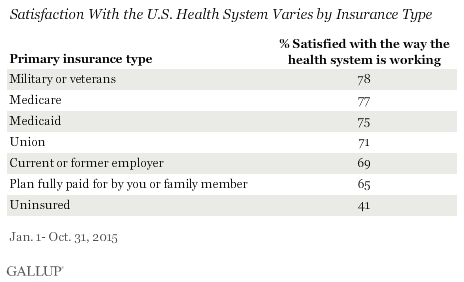By Rebecca Riffkin and Glynn Wilson –
WASHINGTON, D.C. — Contrary to the conventional wisdom among conservative Republicans on the national presidential stage, in Congress and in the mainstream and social media circus, Americans with government health care plans are far more satisfied than those with private, corporate plans, according to the latest Gallup poll on he subject.
Satisfaction is highest among those with veterans or military health plans, where 78 percent say they are happy with the system. Those on Medicare are next at 77 percent, with Medicaid close behind at 75 percent. Next are those on union plans, where the survey found that 71 percent say they are satisfied. Satisfaction is lower among those with employer-paid and self-paid insurance plans, or no coverage at all.
Only 69 percent of Americans with employer paid insurance say they are satisfied, and only 65 percent of those who have to pay for it themselves are happy with the system.
About two thirds of Americans, 67 percent, are satisfied with their health care coverage, compared with 66 percent in November 2014 when Gallup first began asking about this at the end of the first Affordable Care Act enrollment period in March 2014.
Americans’ satisfaction is influenced by the nature of their health plans, particularly how much they have to contribute to the cost. As a result, those whose plans are subsidized by the government — including military/veteran health plans, Medicare and Medicaid — are the most likely to be satisfied, according to Gallup.
Those who receive health insurance through a union are slightly more likely to be satisfied than those who receive it through an employer, while those who pay for their own plan are the least satisfied of those who have some type of insurance, including Americans who purchased their own health insurance through Obamacare exchanges in states where the states are not participating in Medicare expansion, such as Alabama. Their lower satisfaction may result from higher deductibles and co-payments not covered by the state they live in.
The higher satisfaction of military/veterans and Medicare recipients could also be explained by age patterns. Older Americans, who are more likely to have these plans, are more satisfied with the way the healthcare system works for them, regardless of the type of insurance they have.
In contrast, the majority of those younger than 65 are on employer plans. Employer plans vary widely, with some employers paying much of the tab, while others pass the costs on to employees.
Gallup’s Bottom Line
“Americans who get their health insurance through government-sponsored or assisted plans, such as Medicare and Medicaid or veterans insurance, are more likely to be satisfied with the way the healthcare system is working for them than those who have employer-paid insurance or who pay for insurance themselves,” Gallup concludes.
There are a number of reasons for this, such as government plans being more inclusive and having a lower direct cost to the insured person than employer plans or personally paid-for plans. Other aspects of the government plans such as access to more specialists, the availability of different services or ease of scheduling appointments may also factor into the higher satisfaction levels.
Further Analysis
While Gallup only hints at this, and the public has no way to find out about it considering the predictably divisive way the media has covered the national problem since President Barack Obama proposed trying to fix the system and getting most Americans covered, the bottom line is that Americans want health care coverage and believe the government has to be involved in that in a big way.
While the Republicans continue to scream “socialism” and vow to repeal Obamacare, three quarters of the American public would rather have a “socialist” government health care system – as long as politicians don’t call it socialism.
Survey Methods
Results are based on telephone interviews conducted Jan. 1-Oct. 31, 2015, as part of Gallup Daily tracking, with a random sample of 147,517 adults, aged 18 and older, living in all 50 U.S. states and the District of Columbia. For results based on the total sample of national adults, the margin of sampling error is plus or minus 1 percent at the 95 percent confidence level. All reported margins of sampling error include computed design effects for weighting.
Each sample of national adults includes a minimum quota of 50 percent cellphone respondents and 50 percent landline respondents, with additional minimum quotas by time zone within region. Landline and cellular telephone numbers are selected using random-digit-dial methods.














